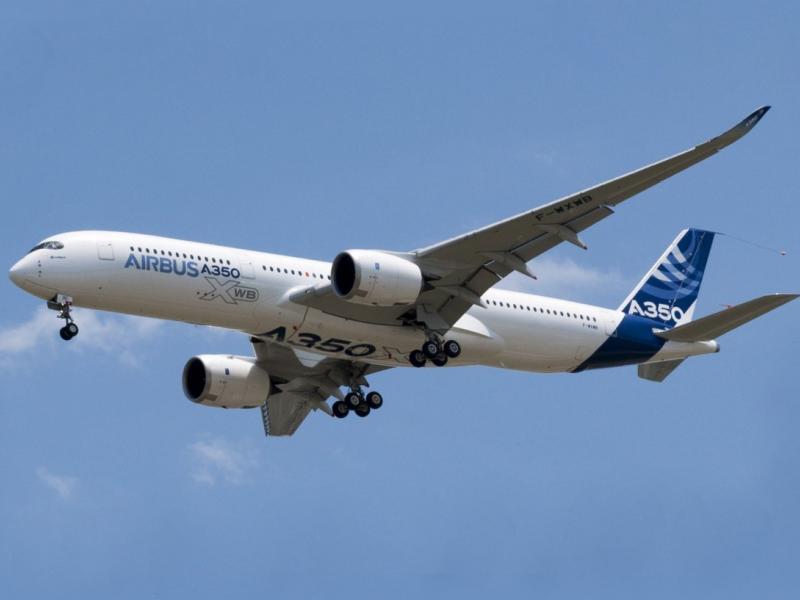HYDERABAD, INDIA — European airframer Airbus has tried for years to find a new customer for its new generation widebody jets in India.
But, Remi Maillard, the manager of Airbus' India unit, says things are about to change. The European planemaker has now increased its efforts to sell its state-of-the-art A350 jets to India's formerly state-run flagship carrier, which is now owned by the country's one of the biggest holdings Tata Group.
Sources close to Tata Group said the Indian conglomerate was both in talks with Airbus and Boeing to replace Air India's aging Boeing 777 fleet. A recent statement from the Indian manager reveals that European aircraft manufacturer has now been taking the lead in the race.
“We believe the A350 will trigger a tectonic shift, a change of paradigm in long-haul travel that matches the aspiration of India and its people,”
Maillard told reporters in the southern city of Hyderabad, where top aviation executives and government officials have gathered this week for the Wings India airshow.
“The A350 will play a strategic role in this transformation,”
Maillard added.
Airbus flew an A350 to three major Indian cities over the past three days, showcasing its newer-generation widebody jet's potential to the customers and media. On Tuesday, Ratan Tata, the Tata Group patriarch who was recently named chairman of Air India, also toured the plane. On the other hand, Boeing is trying to promote Boeing 787 Dreamliner as Air India's B777 successor. Air India has a fleet of 16 Boeing 777 jets, with an average age of more than 12 years. and 27 Boeing 787 Dreamliners of which seven are currently grounded.
"In India, widebody fleets have remained mostly stagnant for 20 years while single-aisle fleets multiplied by a factor of six. The growth in the domestic market for the last 20 years will be seen in the international market now.”
Airbus flew an A350 to three major Indian cities over the past three days, showcasing its newer-generation widebody jet's potential to the customers and media. On Tuesday, Ratan Tata, the Tata Group patriarch who was recently named chairman of Air India, also toured the plane. On the other hand, Boeing is trying to promote Boeing 787 Dreamliner as Air India's B777 successor. Air India has a fleet of 16 Boeing 777 jets, with an average age of more than 12 years. and 27 Boeing 787 Dreamliners of which seven are currently grounded.
"In India, widebody fleets have remained mostly stagnant for 20 years while single-aisle fleets multiplied by a factor of six. The growth in the domestic market for the last 20 years will be seen in the international market now.”
Maillard said.
Airbus’s lack of success selling widebody planes to Indian carriers contrasts sharply with what it’s achieved with narrowbody aircraft. IndiGo, operated by InterGlobe Aviation Ltd., is the world’s biggest customer for A320neo jets, and the local affiliates of Singapore Airlines Ltd. and AirAsia all operate the A320 family. Tata Group holds the majority stake in both carriers.
India will need 2,210 aircraft over the next 20 years according to an analysis recently published by Airbus. According to the report, only 440 of them are expected to be widebody planes that will capable of serving long-haul routes. European planemaker predicts, India will be the world's one of fastest-growing commercial aviation markets with an annual growth rate of 6.3% percent for the period.
Airbus’s lack of success selling widebody planes to Indian carriers contrasts sharply with what it’s achieved with narrowbody aircraft. IndiGo, operated by InterGlobe Aviation Ltd., is the world’s biggest customer for A320neo jets, and the local affiliates of Singapore Airlines Ltd. and AirAsia all operate the A320 family. Tata Group holds the majority stake in both carriers.
India will need 2,210 aircraft over the next 20 years according to an analysis recently published by Airbus. According to the report, only 440 of them are expected to be widebody planes that will capable of serving long-haul routes. European planemaker predicts, India will be the world's one of fastest-growing commercial aviation markets with an annual growth rate of 6.3% percent for the period.

